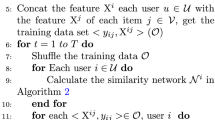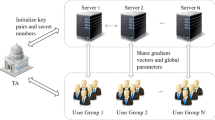Abstract
Federated recommendation addresses the data silo and privacy problems altogether for recommender systems. Current federated recommender systems mainly utilize cryptographic or obfuscation methods to protect the original ratings from leakage. However, the former comes with extra communication and computation costs, and the latter damages model accuracy. Neither of them could simultaneously satisfy the real-time feedback and accurate personalization requirements of recommender systems. In this work, we proposed federated masked matrix factorization (FedMMF) to protect the data privacy in federated recommender systems without sacrificing efficiency and effectiveness. In more details, we introduce the new idea of personalized mask generated only from local data and apply it in FedMMF. On the one hand, personalized mask offers protection for participants’ private data without effectiveness loss. On the other hand, combined with the adaptive secure aggregation protocol, personalized mask could further improve efficiency. Theoretically, we provide security analysis for personalized mask. Empirically, we also show the superiority of the designed model on different real-world data sets.
Access this chapter
Tax calculation will be finalised at checkout
Purchases are for personal use only
Similar content being viewed by others
References
Abdi, H., Williams, L.J.: Principal component analysis. Wiley Interdisc. Rev. Comput. Stat. 2(4), 433–459 (2010)
Ammad-Ud-Din, M., et al.: Federated collaborative filtering for privacy-preserving personalized recommendation system. arXiv preprint arXiv:1901.09888 (2019)
Aono, Y., Hayashi, T., Wang, L., Moriai, S., et al.: Privacy-preserving deep learning via additively homomorphic encryption. IEEE Trans. Inf. Forensics Secur. 13(5), 1333–1345 (2017)
Bonawitz, K., et al.: Practical secure aggregation for privacy-preserving machine learning. In: Proceedings of the 2017 ACM SIGSAC Conference on Computer and Communications Security, pp. 1175–1191 (2017)
Cantador, I., Brusilovsky, P., Kuflik, T.: 2nd workshop on information heterogeneity and fusion in recommender systems (HETREC 2011). In: Proceedings of the 5th ACM Conference on Recommender Systems, RecSys 2011. ACM, New York (2011)
Chai, D., Wang, L., Chen, K., Yang, Q.: Secure federated matrix factorization. IEEE Intell. Syst. 36, 11–20 (2020)
Dwork, C., Roth, A., et al.: The algorithmic foundations of differential privacy. Found. Trends Theor. Comput. Sci. 9(3–4), 211–407 (2014)
Gentry, C.: Fully homomorphic encryption using ideal lattices. In: Proceedings of the Forty-First Annual ACM Symposium on Theory of Computing, pp. 169–178 (2009)
Harper, F.M., Konstan, J.A.: The movielens datasets: history and context. ACM Trans Interact. Intell. Syst. (TiiS) 5(4), 1–19 (2015)
Hua, J., Xia, C., Zhong, S.: Differentially private matrix factorization. In: Proceedings of the Twenty-Fourth International Joint Conference on Artificial Intelligence, pp. 1763–1770. AAAI Press (2015)
Koren, Y., Bell, R., Volinsky, C.: Matrix factorization techniques for recommender systems. Computer 42(8), 30–37 (2009)
Lazard, D.: Thirty years of polynomial system solving, and now? J. Symb. Comput. 44(3), 222–231 (2009)
McMahan, B., Moore, E., Ramage, D., Hampson, S., Arcas, B.A.: Communication-efficient learning of deep networks from decentralized data. In: Artificial Intelligence and Statistics, pp. 1273–1282. PMLR (2017)
McMahan, H.B., et al.: Advances and open problems in federated learning. Found. Trends® Mach. Learn. 14(1) (2021)
Montgomery, D.C., Peck, E.A., Vining, G.G.: Introduction to Linear Regression Analysis, vol. 821. Wiley, Hoboken (2012)
Rendle, S.: Factorization machines. In: 2010 IEEE International Conference on Data Mining, pp. 995–1000. IEEE (2010)
Robertson, S.: Understanding inverse document frequency: on theoretical arguments for IDF. J. Documentation (2004)
Shamir, A.: How to share a secret. Commun. ACM 22(11), 612–613 (1979)
Yang, L., Tan, B., Zheng, V.W., Chen, K., Yang, Q.: Federated recommendation systems. In: Yang, Q., Fan, L., Yu, H. (eds.) Federated Learning. LNCS (LNAI), vol. 12500, pp. 225–239. Springer, Cham (2020). https://doi.org/10.1007/978-3-030-63076-8_16
Yang, Q., Liu, Y., Chen, T., Tong, Y.: Federated machine learning: concept and applications. ACM Trans. Intell. Syst. Technol. (TIST) 10(2), 1–19 (2019)
Yao, A.C.: Protocols for secure computations. In: 23rd Annual Symposium on Foundations of Computer Science (SFCS 1982), pp. 160–164. IEEE (1982)
Yegnanarayana, B.: Artificial Neural Networks. PHI Learning Pvt., Ltd. (2009)
Zhu, L., Liu, Z., Han, S.: Deep leakage from gradients. In: Advances in Neural Information Processing Systems, pp. 14774–14784 (2019)
Author information
Authors and Affiliations
Corresponding author
Editor information
Editors and Affiliations
Rights and permissions
Copyright information
© 2023 The Author(s), under exclusive license to Springer Nature Switzerland AG
About this paper
Cite this paper
Yang, L. et al. (2023). Practical and Secure Federated Recommendation with Personalized Mask. In: Goebel, R., Yu, H., Faltings, B., Fan, L., Xiong, Z. (eds) Trustworthy Federated Learning. FL 2022. Lecture Notes in Computer Science(), vol 13448. Springer, Cham. https://doi.org/10.1007/978-3-031-28996-5_3
Download citation
DOI: https://doi.org/10.1007/978-3-031-28996-5_3
Published:
Publisher Name: Springer, Cham
Print ISBN: 978-3-031-28995-8
Online ISBN: 978-3-031-28996-5
eBook Packages: Computer ScienceComputer Science (R0)




